Prayagraj: An alleged dowry death and a gruesome revenge
- Published
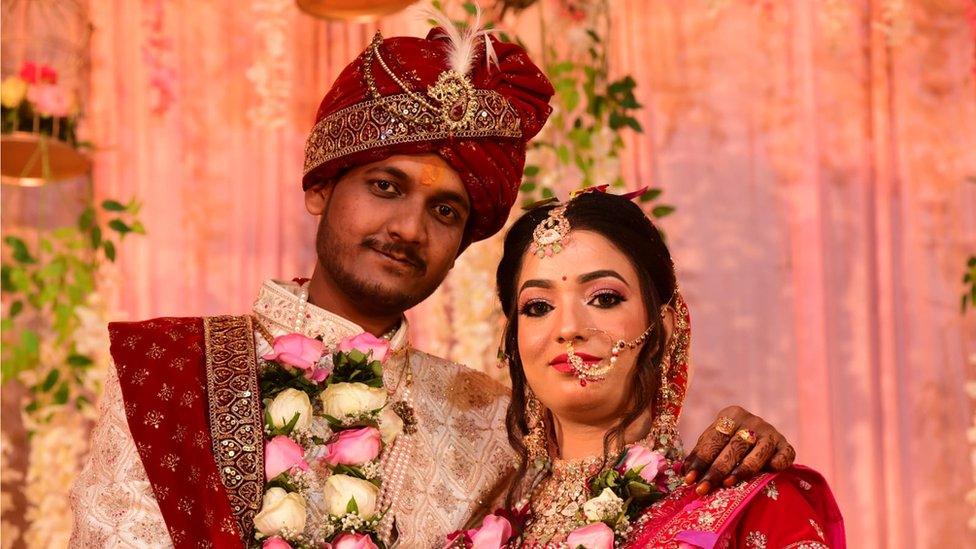
Anshu and Anshika Kesarwani had a lavish wedding in 2023
A horrible tragedy has singed two families, left three people dead and sent seven people to jail in India.
The incident on the night of 18 March in the northern city of Prayagraj (formerly Allahabad) has also sent shockwaves through the residents of two crowded middle-class neighbourhoods.
Warning: This piece contains details that some may find distressing.
"It was around 11pm when about 60-70 people turned up at our home. They started beating us mercilessly," says Shivani Kesarwani.
The intruders, she says, included family members and relatives of Anshika, her brother Anshu's wife, who had been found hanging at the Kesarwani home an hour earlier.
Shivani and the police say Anshika died by suicide - but her family and neighbours allege that she was murdered for dowry.
The Kesarwanis had a family business dealing in timber and lived in a joint family. The ground floor and the basement were taken up by the shop and the warehouse and the family lived above it. Each floor had one bedroom - Anshu lived on the top floor with his wife since their marriage a year back, his parents lived on the first floor and his sister Shivani had the second floor.
"Anshika usually came down around 8pm for dinner but on that day, she didn't show up and we thought she must have fallen asleep," Shivani told the BBC.
When her brother came up from the store at 10pm, she said, he went up to call his wife.
"When his knocks and calls went unanswered, he broke a glass pane above the door to release the lock. He found Anshika dead. He screamed and all of us went rushing up."
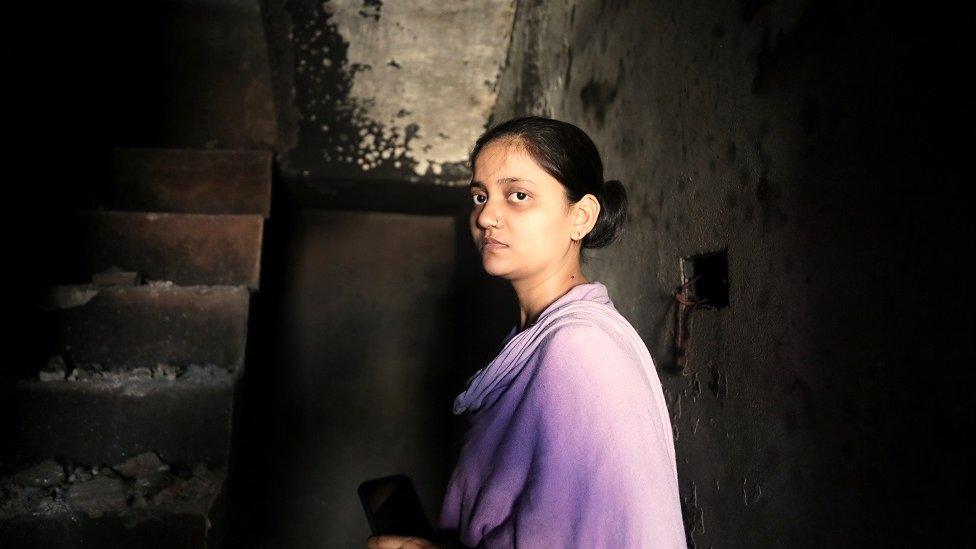
Shivani Kesarwani has lodged a police complaint accusing her sister-in-law's family of setting her house on fire
Anshu and his uncle reported the death to the police station, less than half a kilometre from their home, and Anshika's parents were informed.
Less than an hour later, police say, Anshika's family turned up along with dozens of relatives and within minutes, an ugly fight is said to have broken out between the families.
On her mobile phone, Shivani shows us videos of men shouting, hitting each other with wooden sticks. A policeman stands in the middle, trying - and failing - to bring order.
Once Anshika's body was taken out of the house, police say her relatives set fire to the house.
The timber, stored in the ground floor and basement, burned furiously, trapping Shivani, her parents and an aunt in the house.
Shivani and her aunt broke the window of the second floor and crawled to safety in the adjoining house which belongs to her uncle. Her parents were not so lucky.
When firefighters, who took more than three hours to put out the blaze, entered the house around 3am, they found the elderly couple's charred bodies.
"My mother was found sitting on the steps. She was carried to the mortuary in a sack," says Shivani, wiping her tears.
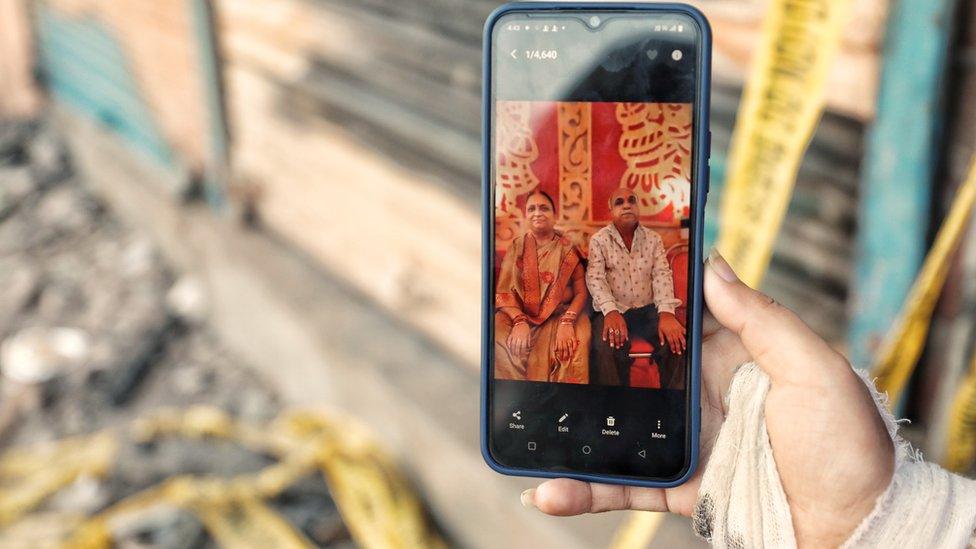
Shivani shows a photograph of her parents Rajendra Kumar and Shobha Devi who died in the fire
Shivani's complaint to the police names 12 members of Anshika's family and "60-70 unknown people".
A police official told the BBC that seven people, including Anshika's father and uncle and their sons, have since been arrested and remain in jail.
They say Anshika's father has lodged a counter-complaint accusing "Anshu, his parents and sisters" of harassing his daughter for dowry and murdering her.
Shivani denies the accusations against her family, although she admits that they had received gifts, including a car, from Anshika's family at the wedding. "They gave whatever they wanted to their daughter. We didn't ask for anything," she says.
Anshu has not returned home since the night his wife died. "He's in hiding because with most of Anshika's relatives out of jail, he fears for his life," she adds.
Dowries - both giving and accepting - have been illegal in India since 1961, but 90% of Indian marriages still involve them, according to a recent study.
Police receive thousands of complaints of harassment of wives every year and crime data shows 35,493 brides were killed in India between 2017 and 2022 for bringing in insufficient dowry.
But this kind of supposed gruesome revenge in a case of alleged dowry death is unheard of.
Shivani, who is now living with her uncle's family next door, takes us for a walk through what - until recently - used to be her home. The remnants of that night's tragedy are strewn about everywhere. The walls are blackened with soot and the floor is covered in thick ash, dotted with metal pots and pans and burnt out skeletal remains of furniture.
"I want justice. My life is ruined, my home and family are gone. I want a free and fair investigation and everyone who's found guilty must be punished," she says, adding, "Why did they burn the house down? How would we find any evidence now?"
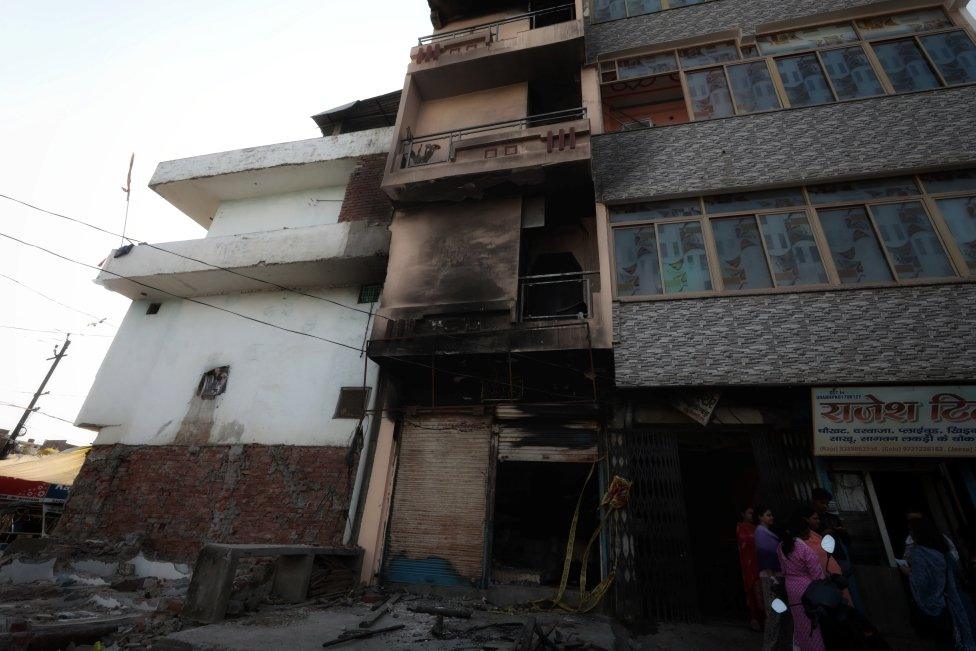
The Kesarwani house and the shop were reduced to cinders in the fire
She's also angry with the police. "There were at least two dozen policemen outside our home but no-one went in to save my parents. They just stood and watched," she alleges.
Police strongly contest the accusation. "It was a sensitive issue and emotions were running high. We were focused on removing the body from the scene and taking it to hospital for post-mortem. Our aim was to reduce the crowd and defuse the situation," a senior police officer who did not want to be named told the BBC.
"No-one anticipated the house would be set on fire. It was totally unexpected," he added. "We called the fire services immediately. We also helped rescue five people."
The double tragedy has also scarred Anshika's family. To hear their side of the story, we visit her parents' home where Anshika lived until her wedding a year back. It's locked with a huge iron padlock on the main gate.
Just 2km away from Anshika's home is her uncle's house. He and his sons are among those who have been arrested. The family has so far refused to speak to the media.
Our knocks on the door bring out Jawahar Lal Kesarwani, Anshika's nonagenarian grandfather. One of his grandchildren brings out a plastic chair and he sits down, breathing laboriously.
"What can I tell you? All my family is in jail, my sons, my grandsons," he says after a few minutes.
"They killed Anshika and hanged her to make it look like a suicide," he adds.
Anshika's wedding, Mr Kesarwani tells me, was a lavish affair. "We spent 5m rupees ($60,000; £48,000). We gave her everything a household requires, and a car that cost 1.6m rupees."
He adds that when Anshika visited them last in February, "she told us that she was being harassed. We told her to stay put, to adjust, we told her things would get better", he says with a note of regret in his voice.
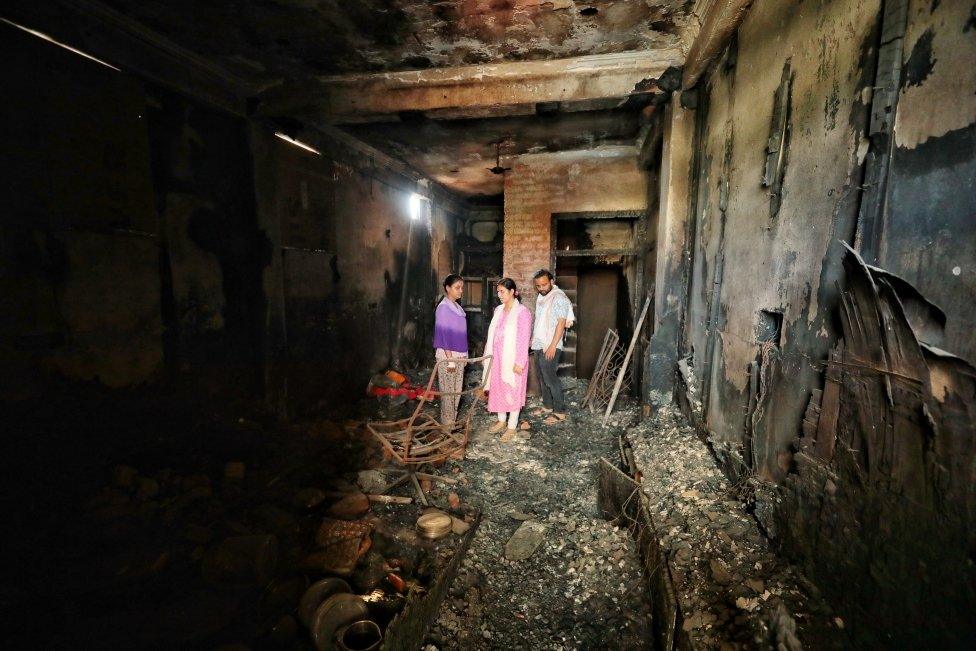
The remnants of that night's tragedy are strewn about everywhere
The Kesarwanis are a reputed family in their locality, variously described as humble, friendly and helpful, and the details of the double tragedy have left their neighbours in shock.
"They're very good people. We can't even begin to imagine how this could happen. They are not people who get embroiled in brawls," says a man who lives a few doors down their street.
"We don't know who lit the fire, but anyone would lose their mind on seeing their daughter's body," he adds.
A woman in the neighbourhood says Anshika "was very well behaved… a lovely girl" and describes her family as "very simple… incapable of the gruesome crime they are being accused of".
"It's unfortunate that her parents'-in-law died in the fire," she says.
"But what makes me really sad is that now no-one is talking about what happened to Anshika. How did she die? "
Photos by Ankit Srinivas